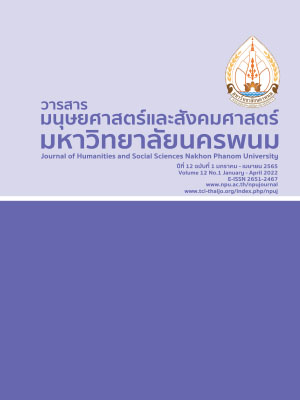Indicators for Empathetic leadership in Private School Administrators : A Qualitative Study
Main Article Content
Abstract
The objective of this study was to determine the indicators for the empathetic leadership among the private educational administrators. This study applied qualitative method which included two phase. The first phase conducted extensive literature with employing content analysis to propose the framework for empathetic leadership. The second phase conducted in-depth interviews with experts. They were seven informants including educational administrators, leadership’s expert, educational psychology’s scholars, educational background doctors, self-development moderators/facilitators, private schools’ administrators. The interviews resulted tonine-indicators for empathetic leadership including 1) self awareness 2) self regulation 3) articulation of self values and vision 4) empathetic communication 5) compassionate collaboration 6) inspiration 7) empowerment 8) social empathy 9) experiential based-lesson. Such indicators reflected leadership that acquired the individual quality as from inside to outside. The explanation of such indicators followed the transformational leadership theory which focused on the horizontal relationship, especially the context of private school that were sensitive to change. With this said, empathetic leadership was significant in the private school administration. The result also revealed that each single research factor cannot stand without others. It suggested that the quality of administrative evaluation required self-assessment. The contribution of this research project will be used as information for doing research focusing on leadership and applied as guidance for empathetic leadership development for private school administrators or leaders working in other organizations.
Article Details

This work is licensed under a Creative Commons Attribution-NonCommercial-NoDerivatives 4.0 International License.
References
2. พระธรรมปิฎก (ป.อ.ปยุตฺโต). (2559). พจนานุกรมพุทธศาสตร์ ฉบับประมวลธรรม (พิมพ์ครั้งที่ 34). มูลนิธิการศึกษาเพื่อสันติภาพพระธรรมปิฎก (ป. อ. ปยุตฺโต).
3. Abdul-Mageed, M., Buffone, A., Peng, H., Eichstaedt, J., & Ungar, L. (2017). In International AAAI Conference on Web and Social Media. Retrieved from https://aaai.org/ocs/index.php/ICWSM/ICWSM17/paper/view/15639
4. Bughin.,J, (2017). The right response to digital disruption. MIT Sloan Management Review. Retrieved from https://www.mckinsey.com/mgi/overview/in-the-news/the-right-response-to-digital-disruption
5. Castillo I, Adell FL and Alvarez O (2018) Relationships Between Personal Values and Leadership Behaviors in Basketball Coaches. Front. Psychol. 9:1661. doi: 10.3389/fpsyg.2018.01661.
6. Dubrin, AJ. (2017). Leadership: Research findings, practice, and skills (8th Edition): Boston: Centage Learning.
7. Gentry, W., Weber, T., Center for Creative Leadership, Golnaz, S., & Teachers College. (2016). Empathy in the workplace: A tool for effective leadership. Center for Creative Leadership. https://doi.org/10.35613/ccl.2016.1070
8. Goleman, D. (2015). Focus: The Hidden Driver of Excellence (Illustrated edition). Harper Paperbacks.
9. Kaplan, B., & Manchester, J. (2018). The Power of Vulnerability: How to Create a Team of Leaders by Shifting INward. Greenleaf Book Group Press.
10. Kock, N., Mayfield, M., Mayfield, J., Sexton, S., & De La Garza, L. M. (2019). Empathetic Leadership: How Leader Emotional Support and Understanding Influences Follower Performance. Journal of Leadership & Organizational Studies, 26(2), 217–236.
11. Reiss, H., (2017). The Science of Empathy. J Pat Exp, 2017, Vol. 4(2) 74-77.
12. Rhoades, B. (2016). The power of admitting a mistake. SkipPrichard Leadership Insight. Retrieved from https://www.skipprichard.com/the-power-of-admitting-a-mistake/
13. Solis, B. (2017). Digital Transformation is About Empathy First. Retrieved from https://www.prophet.com/ thinking/2014/11/digital-transformation-is-about-empathy-first-and-technology-second/
14. Weltwirtschaftsforum, & Zurich Insurance Group. (2019). Global risks 2019: Insight report. http://www3.weforum.org/docs/WEF_Global_Risks_Report_2019.pdf
14. Williams, R. (2016). Why we need more empathetic and compassionate leaders. Psychology Today. Retrieved from https://www.psychologytoday.com/blog/wired-success/201608/why-we-need-more-empathetic-and-compassionate-leaders
Translated Thai References
1. The committee for inhering the Kings’Philosophy. (2017). Driven inheriting the King’s Philosophy for the country reform. Bangkok: the Office of the Commissioner. [in Thai]
2. Payutto, P. (2016). Dictionary of Buddhism, interpretation of Buddhadhama (34th print). Bangkok: the Foundation for Education for Peace, Pradhammapidok (P.A. Payutto). [in Thai]


